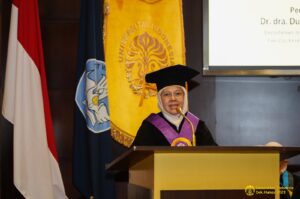
PROFESSOR OF FKM UI, PROF. DUMILAH: INDONESIA NEEDS TO STRENGTHEN POLITICAL PRIORITIES IN DEVELOPING HEALTH POLICIES FOR VULNERABLE GROUPS
In her inauguration speech as Professor of the Faculty of Public Health, Universitas Indonesia (FKM UI), Prof. Dr. dr. Dumilah Ayuningtyas, M.A.R.S., conveyed that disparities in health services still occur in Indonesia. “The Secretary General of the Indonesian Medical Association (IDI) explained that the number of doctors in Indonesia is sufficient, but they are concentrated in certain big cities and provinces. It is recorded that DKI Jakarta is the province with the best ratio of doctors, meaning that one doctor treats 608 residents. Meanwhile, West Sulawesi is the province with the lowest ratio as one doctor takes care of 10,417 residents,” said Prof. Dumilah, on Wednesday (8/3).
She continued, based on the World Health Organization (WHO), vulnerable groups are defined as the homeless, people living in inadequate homes, migrant workers, persons with disabilities, people living in remote areas, people living in poverty, people affected by vulnerability, and people affected by the digital divide, who until now their rights to be healthy have not been fulfilled. The definition of vulnerable groups according to Law Number 39 of 1999 is still limited to certain groups and should be renewed. “Several vulnerable groups that have not received optimal attention include Indigenous Peoples or Remote Indigenous Communities, People with HIV/AIDS, and migrant workers,” said Prof. Dumilah.
According to her, strengthening political priorities in terms of developing health policies for vulnerable groups needs to be done because this can urge policymakers to increase political will in using energy and making efforts to achieve their political goals. This is in line with the main target of the 2030 Agenda for Sustainable Development “Leave No One Behind”. The COVID-19 pandemic is clear evidence of how the political priorities for handling the pandemic have succeeded in turning a chaotic situation into an achievement.
Prof. Dumilah then presented a Predictive Model for Strengthening Political Priorities in Health Policy Development which had been adapted to conditions in Indonesia. “The complexity of the dynamic situation in Indonesia means that it is impossible to describe the development of health policy simply by referring to the existing standard framework or model. Adaptation and contextualization adjustments are needed from the previous framework to be able to analyze and understand the situation that is happening,” said Prof. Dumilah.

At the end of the presentation, Prof. Dumilah read a poem that narrated how to strengthen political priorities in developing health policies that would be meaningful to society, especially vulnerable groups. She hopes that the gaps and gloom of health services for vulnerable people will one day become displays in museums with the implementation of political priorities that have been voiced from the start.
Prof. Dumilah’s inauguration was led by UI Rector Prof. Ari Kuncoro, SE, MA, Ph.D., and broadcast virtually via Universitas Indonesia and UI Teve Youtube channels. The event was attended by Member of the House of Representatives of Indonesia Commission VIII, Dr. IR. H. Nanang Samodra, KA., M.Sc.; Chairman of the Advisory Council of the President for the Minister of Health of the Republic of Indonesia for the period 2004-2009, Dr. dr. Siti Fadilah Supari, Sp.JP(K).; Chairman of the Management Board of the Korpri Unit of the Indonesian National Army for the 2020-2024 period, drg. Nora Tristyana, MARS.; Chairman of the Indonesian Association of Health Consultants, Brigadir Jenderal (Purn.) Dr. dr. Supriyantoro, Sp.P.MARS.; Head of the Health Center for the Indonesian National Army, Mayor Jenderal TNI (Purn.) dr. Budiman, Sp.BP-RE(K)., MARS., MH.; Chairman of IKAMARS / Professional Director of Health Workers RSPAD, Brigadir Jenderal TNI dr. Dewi Puspitorini, Sp.P., M.A.R.S.; Head of Center for Policy on Health Resilience System and Health Resources of the Ministry of Health, Dr. I. Gede Made Wirabrata, S.Si., Apt., M.Kes., M.M., M.H.; Dean of the Faculty of Public Health, Universitas Airlangga, Dr. Santi Martini, M. Kes.; and Main Director of RSUI, Dr. dr. Astuti Giantini, Sp. PK(K), MPH.
Prof. Dumilah successfully completed her undergraduate at the Department of Biology, FMIPA UI, in 1991. Then she continued her master’s and doctoral studies at the same campus in 2000 and 2011. Several of her scientific publications were indexed by Scopus, including Inclusivity of Persons with Disabilities in the Work Sector During the Covid-19 Pandemic in Indonesia (2022), Geographic and Socioeconomic Disparity in Child Undernutrition across 514 Districts in Indonesia (2022), Assessing the food control system in Indonesia: A conceptual framework (2022), Requesting the Indonesian Government’s Public Policy Response to the COVID-19 Pandemic: Black Box Analysis for the Period of January–July 2020 (2021), and Gap analysis for drug development policymaking: An attempt to close the gap between policy and its implementation (2019).



